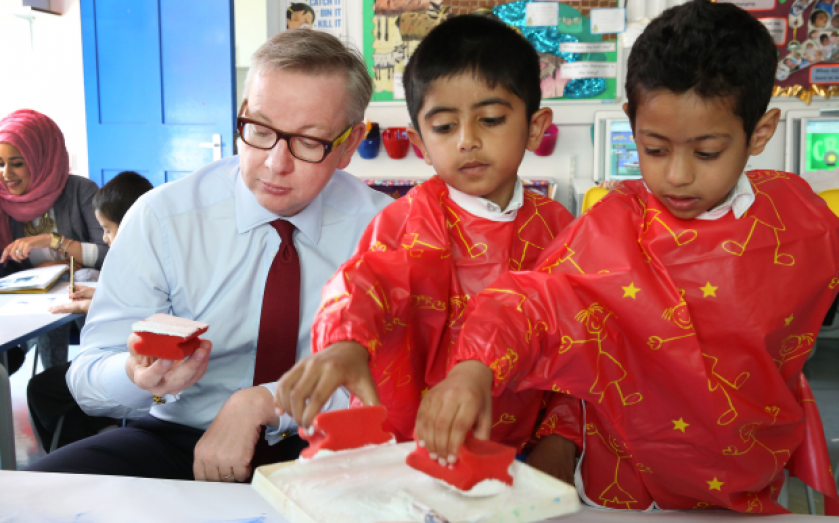Michael Gove’s illiteracy crusade will have huge benefits for our economy

NEARLY half of all businesses are forced to provide literacy classes because many recruits can’t write a coherent memo. Even graduates from our best universities, according to anecdotal evidence from employers, have difficulty expressing themselves in comprehensible written sentences — hence so much dreadful bureaucratese.
Meanwhile, a large proportion of universities are offering remedial courses in literacy to new undergraduates, and many secondary schools are compelled to give basic lessons in reading and writing to pupils who have not learned these skills at primary school.
This is not a new story. It was known in the 1990s, when the then inspector of schools said that 15,000 teachers were not up to the job. It was known in 2005, when Tony Blair made his famous “education education education” speech. And it had become dismayingly familiar by the time Michael Gove took over as secretary of state for education in 2010.
A great many literacy initiatives and campaigns — some governmental, some private – have been launched to address the problem. There was the Literacy Hour imposed on all schools in 1998, the Every Child a Reader programme of 2005, and countless one-to-one schemes, carried out by well-meaning volunteers.
And yet, according to the inspector of schools Sir Michael Wilshaw, reading standards have stalled since 2005. One in five children leaves primary school without being able to read — let alone write — properly. What’s wrong, exactly?
The answer seems obvious to me. “The most important part of education is training in the nursery,” said Plato. But this is not how most of the educational establishment sees it. They regard the early years of school as a time for play, creativity and self-expression. Requiring young children to memorise facts and figures has been perceived, since the 1960s, as stifling a child’s imagination. Discipline and order are seen as authoritarian. Young children should never be forced to do anything they don’t choose to. Drumming things in, is out.
This ideology, to which most teacher-training colleges — and their alumni — passionately adhere, is at the root of the literacy problem. A student teacher told me recently how reading lessons are conducted in her primary school: the teacher downloads a section of “letters and sounds”, the Department of Education’s phonics programme; the class then goes through it cursorily for about ten minutes; and for the rest of the lesson the children are handed a heap of illustrated books and told to get on with reading.
This attitude is reflected in the casual way classrooms are organised. Instead of whole-class teaching, where the teacher demands the attention of every pupil, children are divided into groups and given assignments. This may work well for older children, but in the case of six-year-olds it often leads to boredom, distraction and misbehaviour. No wonder many of them don’t learn to read properly. And no wonder many of them later suffer from a work-ethic deficit.
This misguided approach to teaching completely ignores the fact that the majority of young children are eager to learn. Their imagination can’t thrive in a vacuum – it needs knowledge to get it going. At primary-school age, pupils are better than they will ever be again at memorising and retaining facts – facts that are much more tedious to learn later. That includes the letters and sounds of the alphabet and how they fit together to make words. And contrary to the prevailing ethos, young children visibly enjoy learning in a structured and disciplined environment. Strict teachers, so long as they are fair, are often more popular than lax ones.
Michael Gove understands all this. He is making a heroic effort to change, or bypass, the dominant orthodoxy. But the task is huge. At its annual conference earlier this year, the National Union of Teachers (NUT) threatened to boycott the government’s new literacy tests for six-year olds, as well as its spelling, punctuation and grammar tests for 11-year olds. It condemned the imposition of “unnecessary tests,” which would “leave many children feeling a failure”.
But Katie Ivens – who runs the educational charity Real Action, which teaches some of the most deprived children in London to read – thinks otherwise: “Children adore tests – they regard them like games. They only dislike tests if they haven’t been taught properly.”
Michael Gove, according to a typical NUT delegate, “wants a world without music, without art, without creativity”. The reverse is true. If Gove succeeds in transforming primary schools, businesses and the economy as a whole will benefit immensely. And so will the arts.
Miriam Gross is a former literary editor and voluntary teacher. Her report So Why Can’t they Read? was published by the Centre for Policy Studies. She authored An Almost English Life (Short Books).